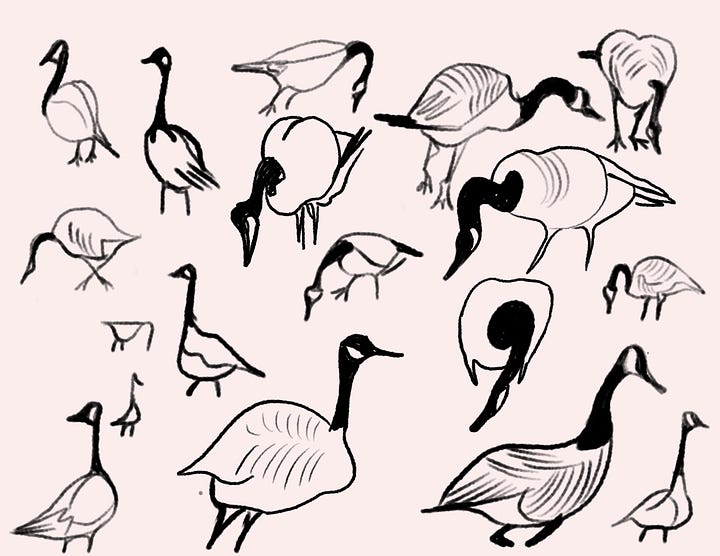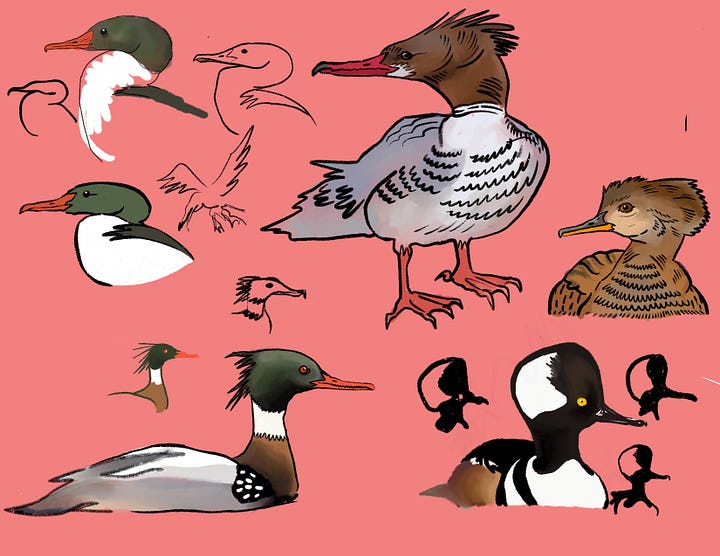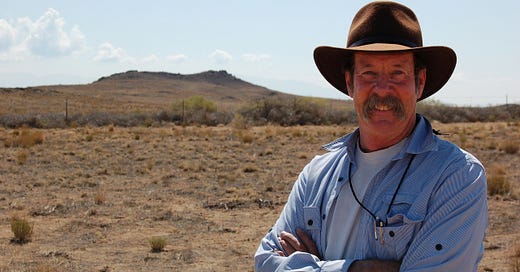Photo University of New Mexico
My friend Professor Bruce Huckell, with the Maxwell Museum and the Department of Anthropology at the University of New Mexico, passed away on May 13, 2024, in Albuquerque. I’m honored to have worked with Bruce many years ago, and am proud to call him friend.
I think that it was in September or October last year when our former student, now Professor David Kilby of Texas State University, emailed me that Bruce had died, and that he would be honored during a special session of the Society for American Archaeology meetings that was held in Denver yesterday. Dave asked me if I would like to share some thoughts about Bruce with those gathered for the session. I probably said yes, with a bit of equivocation, because figuring out what to write about the passing of a loved one is hard. After all, what are the most important 1,000-2,000 words one can say about someone after years of knowing and caring about them?
Anyway, I procrastinated, even with occasional prodding by Dave, until I received an email from him on Wednesday asking if I would have something written to be read on Thursday, or if he had to come up with Plan B. Plan B? I didn’t know that if I didn’t come through that there would have to be a Plan B! And Plan B would certainly inconvenience someone, and I didn’t want that.
I was busy in Des Moines when I got the email, and knowing that time was tight and that I had no idea what I would write, I responded that I didn’t think I had the bandwidth to do it and that I was sorry.
After a few minutes, though, my story about what Bruce meant to me and others came together in my head, and I emailed Dave back, telling him I would have something for him yesterday morning before the session.
I wrote the following in about three hours Wednesday night, read it through one more time Thursday morning, tinkered with it, and then sent it to Dave. Here it is, as read yesterday, in memorium to our dear friend Bruce Huckell:
As anthropologists, we all know that Americans and most Europeans are terrible at coping with the deaths of those we love and with our own. It wasn’t always this way, as the historian Philippe Ariès shared in his 1974 book Western Attitudes Toward Death from the Middle Ages to the Present. Prior to the seventeenth century, people were acutely aware of their own imminent death, prepared for it, and accepted it. As science progressed and solved many challenges, we began to try to deny death, and not see it as part of the normal progression of life. This vision permeates nearly every aspect of our culture, from the use of makeup, plastic surgery, exercise programs, medical practices, funerary rites, and more. I must note here that it was our friend Garth Bawden who introduced me to Ariès.
Many other cultures do a much better job of greeting death, with one example being our friends and kin who celebrate the Day of the Dead. Over the years, having lost my parents, grandparents, 20+ uncles and aunts, a couple dozen cousins or more, and innumerable friends, I’ve come to realize that those who are gone are never really gone and that accepting death as a normal part of life is comforting.
And here I write, with one foot in the grave and the other on a banana peel, making a joke about it. And I joke about my pending demise regularly. For example, when someone tells me “You’re looking good,” I always reply, “I wouldn’t go that far.” When I forget something, especially someone’s name, I always apologize that “my brain is leaky.” When someone says, “It’s good to see you,” I can’t resist saying what other geezers around here say, that “It’s good to be seen.”
And finally, when people ask me, “How are you doing? I always reply, “If you see me, I’m doing good.”
And I can think of no better way to honor the memory of our friend Bruce Huckell at this gathering than to tell some jokes he would laugh at.
I don’t remember how many years Bruce and I have been friends, or the number of years we shared a lab. Lots of things impress me about Bruce, but the one constant was his broad and deep knowledge of the role humans play in relation to our natural world. He was perhaps the best interdisciplinary archaeologist that I have ever known. Nearly every time I thought I knew something about some aspect of the past or present, he had more to teach me about it; kindly and gently, as he did with everyone. He shared his knowledge and wisdom with anyone who wanted to learn, from students, the public, other professionals, the media, but especially students who intuitively knew that his well of knowledge ran deep.
Bruce was a public intellectual--unlike most in the academy who turn internally, often writing in prestigious scholarly journals for the same seven people they went to grad school with, and maybe a few more if they are lucky. While Bruce’s academic writing contributed to our understanding of the past in important ways, his museum work and more popular works, including when he worked with members of the media, brought the past alive to a great many people beyond his peers and students.
The academic model that promotion be tied to scholarly publications, teaching, and service to the institution is broken, minimizing and discouraging efforts to produce popular works of general interest. If we had more public intellectuals like Bruce Huckell, public appreciation of the academy would be such that it would be impossible for tyrants like Donald Trump to pull apart our institutions of higher learning like he and his MAGA brethren are currently doing, as they seek a new dystopian dark age.
My advice to young scholars? Be like Bruce Huckell.
I’ll also say that I can’t tell you how many times Bruce was the only adult in the room at faculty meetings.
Here I would like to share a personal anecdote. My son Asa, who was born in 2001, spent quite a bit of time with Bruce, Lisa, and me in the basement of the anthropology annex before we left Albuquerque to come back to Iowa, where I was born, to be with family. Even though Bruce, Lisa, and I shared the lab, to this day, Asa calls the lab “Bruce’s lab,” and I don’t know how many hours Bruce spent teaching Asa about the skeletal collections in the lab and humanity’s place in nature, gently answering every question. While I would like to think I had a role in helping Asa learn to appreciate our natural world, I sincerely believe that Bruce teaching Asa in those important formative years played a bigger role.


Today, Asa is an artist doing mostly poster art for bands in Boston. I hope Dave is able to share some of Asa’s art (above), because Bruce stimulated his love of the natural world, which is reflected in it. Bruce’s hand is on Asa’s as he draws, I have no doubt.
Bruce’s legacy, his teaching, his kindness, his wisdom, and in particular his love of humanity and our natural world have touched thousands of us and will touch innumerable more for generations to come. Whenever a student, taught by a student, taught by a student, ad infinitum, taught by Bruce, looks at a projectile point, or the crest of a ridge, or puts a trowel to earth, Bruce will be there.
Here I’m thinking of the old Willie Nelson, Kris Kristofferson, Waylon Jennings, and Johnny Cash song, The Highwayman. You know the song. Willie starts out, “I was a highwayman, along the coach roads I did ride…” Kris sings, “I was a sailor, I was born upon the tide…” then Waylon sings, “I was a dam builder, across a river deep and wide…” and finally, Johnny sings, and the rest join in, and here I will share all of Johnny’s lyrics, and the chorus:
I fly a starship,
Across the universe divide,
And when I reach the other side,
I’ll find a place to rest my spirit if I can
Perhaps I may become a highwayman again
Or I may simply be a single drop of rain
But I will remain
And I’ll be back again
And again, and again, and again,
and again, and again…
Thanks, my friend Bruce Huckell. I’ll see you soon. And Lisa, much love.
Would somebody please hug Lisa for me?
Please consider sharing this post and upgrading to a paid subscription if you can afford it.
My content will always be free, as for over 60 years the words of Simon and Garfunkle in their 1964 song, “The Sound of Silence” have influenced me, “the words of the prophets are written on the subway walls and tenement halls,” and I’m not going to paywall them out should they be interested in my writing. My favorite version is by “Disturbed.”
I’m a proud member of the Iowa Writers’ Collaborative. Please check out our work here. Subscribe! Become a paid subscriber if you can afford it. Please and thank you. We need you. Thanks for being part of the team! Want to buy me lunch or a cup of coffee? Venmo @Robert-Leonard-238. My friend Spencer Dirks and I have a podcast titled The Iowa Revolution. Check it out! We can get ornery. And have fun! I also publish Cedar Creek Nature Notes, about Violet the Dog and my adventures on our morning walks at Cedar Bluffs Natural Area in Mahaska County, Iowa.
Here is the Zoom link for this month’s Office Lounge for paid subscribers. It’s always held on the last Friday of the month at noon, except for November and December.





Good read Bob
I’m glad you found the words. What a nice tribute to Bruce. I’m sure Dave really appreciated having this to read at the SAA’s (or having it read). I’m sure Lisa will really appreciate it as well.
I am grateful to have been one of the many, many people impacted by Bruce. His lithics course was one of the first classes I took at UNM - he was one of the first professors I got to know that first semester. His support during the class and later was a factor in making it all the way through. His encouragement (and yours of course) was a factor in my decision to repeat comps.
Quirky coincidence - heard Connor playing The Highwayman a few days ago. It worked well for Bruce’s tribute.